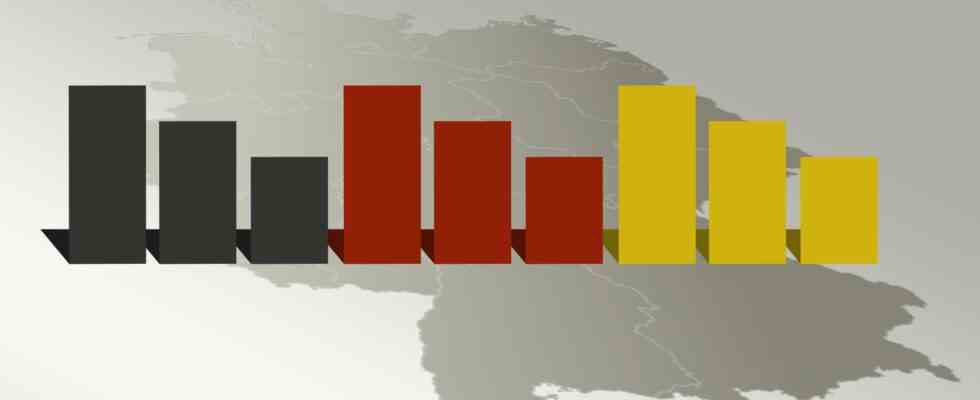Status: 06/24/2022 00:00
Gas is becoming scarce in Germany, which is why the government is desperately looking for alternatives. Noisy ARD Germany trend a majority is in favor of operating nuclear power plants longer. In the Sunday question, the Greens overtake the SPD.
In view of the declining Russian gas supplies, both a reactivation of coal-fired power plants and longer nuclear power plant operating times are currently being discussed in Germany. Both are popular with German citizens in the current situation.
Noisy ARD Germany trend for the morning magazine 56 percent of Germans consider increasing the use of coal-fired power plants, as Economics Minister Robert Habeck had brought up. 36 percent reject this measure.
61 percent support the continued operation of nuclear power plants beyond the end of the year as proposed by the Union and FDP ranks, 32 percent find this wrong.
Much rejection by Green supporters
Longer AKW runtimes are mainly supported by the supporters of the Union (77 percent), the FDP (84 percent) and the AfD (88 percent), but the approval also predominates among the SPD supporters (54 percent). In the ranks of the SPD (65 percent), CDU/CSU (64 percent) and AfD (66 percent), the increased use of coal-fired power plants also met with great agreement, although not quite as clearly among the FDP supporters (52 percent).
The supporters of the Greens, on the other hand, not only reject longer nuclear power plant runtimes (57 percent). They are also critical of the reactivation of coal-fired power plants proposed by Economics Minister Habeck (54).
In contrast to the continued operation of the nuclear power plants, there are clear differences between the age groups, especially when it comes to the question of greater use of coal. While a majority of those aged 50 to 64 (62 percent) and those over 65 (69 percent) support more coal-fired power generation, the majority of those under 35 reject it (48 percent against / 38 percent for).
Encouragement for compulsory wearing of masks indoors
Almost two thirds of Germans (63 percent) are currently in favor of reintroducing the obligation to wear masks indoors as a possible reaction to the increasing number of corona infections in autumn. A third (32 percent) disagree.
Supporters of the three governing parties take opposing positions on the issue. While the majority of supporters of the SPD (78 percent) and Greens (82 percent), but also of the opposition Union (69 percent) are in favor of reintroduction, the FDP (55 percent) and the AfD (69 percent) predominate the rejection.
Clear approval for a mask requirement in autumn comes from older people, who are in favor of it with a large majority (77 percent). Younger people, on the other hand, are more reserved (52 percent). Among the 18 to 34 year olds, agreement (48 percent) and rejection (47 percent) are only roughly balanced.
Greens before SPD
If there were a federal election on Sunday, the union of CDU and CSU would get 26 percent of the vote. The Greens would be the second strongest force with 23 percent, putting them ahead of the SPD. 20 percent would vote for the Social Democrats and 12 percent for the AfD. The FDP would get 8 percent of the votes. The left would get 4 percent. Overall, the governing coalition of SPD, Greens and FDP would get 51 percent of the votes.
Compared to ARD Germany trend from June 2, 2022, the CDU and CSU as well as the SPD will lose one percentage point. The Greens gain two percentage points. The AfD can improve by one percentage point. The values for FDP and Linke remain unchanged.
investigation facility
Universe: Eligible voters in Germany
Collection method: Random telephone and online survey
Survey period: June 21-22, 2022
number of cases: 1248 respondents (816 telephone interviews and 432 online interviews)
Weighting: according to sociodemographic characteristics and recollection of voting behavior; Sunday question with separate weighting
Fault Tolerance: 2* to 3** percentage points
Implementing institute: infratest dimap
* with a share value of 10 percent ** with a share value of 50 percent
Results are rounded to whole percentages to avoid false expectations of precision. Because for all representative surveys, fluctuation ranges must be taken into account. In the case of a survey with 1000 respondents, these amount to around three percentage points for large parties and around one point for smaller parties. In addition, the rounding error is significant for small parties. For these reasons, no party below three percent is shown in the Sunday question.

